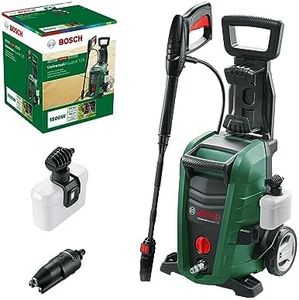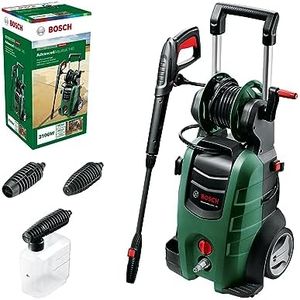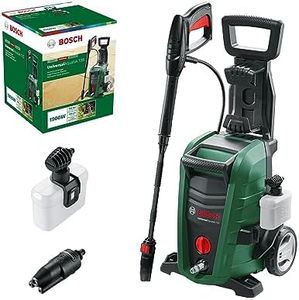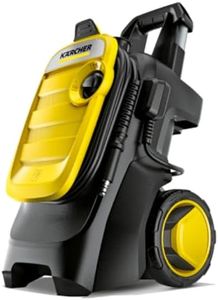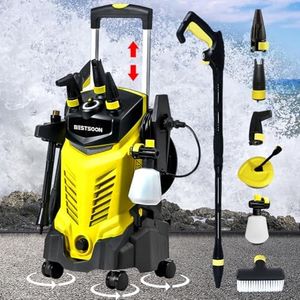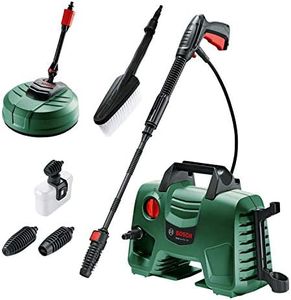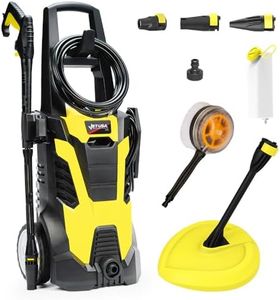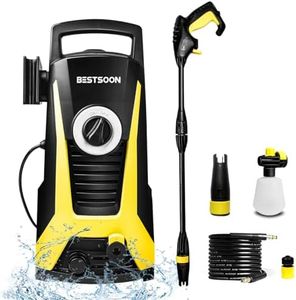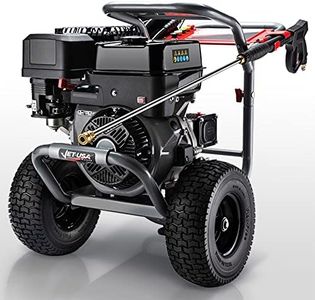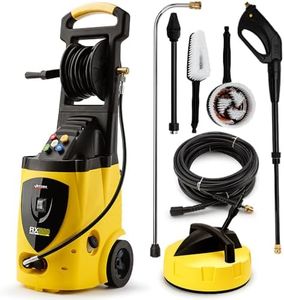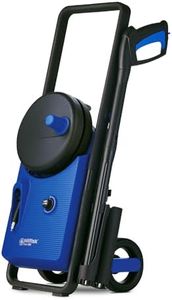We Use CookiesWe use cookies to enhance the security, performance,
functionality and for analytical and promotional activities. By continuing to browse this site you
are agreeing to our privacy policy
10 Best Commercial Grade Pressure Washer
From leading brands and best sellers available on the web.By clicking on a link to a third party's website, log data is shared with that third party.
Buying Guide for the Best Commercial Grade Pressure Washer
Choosing a commercial-grade pressure washer is about matching your cleaning demands with the machine's power, efficiency, and durability. Commercial models are designed for frequent, heavy-duty use and can tackle tough dirt, grease, and stains on large surfaces. As you look for the best fit, it’s important to focus on key features that determine performance and user experience. Understanding what each specification means—and how it affects real-world use—will help you select a pressure washer that fits your specific needs, whether it's for cleaning vehicles, buildings, equipment, or outdoor spaces.PSI (Pounds per Square Inch)PSI measures the pressure of the water the pressure washer delivers, and it directly impacts the machine’s ability to remove tough dirt and grime. Lower PSI values (around 2000 to 3000) are sufficient for light commercial tasks such as cleaning vehicles or outdoor furniture. Mid-range PSI (3000–4000) is suitable for medium-duty tasks like sidewalks and fences. High PSI (4000 and up) is designed for heavy-duty applications such as stripping paint or cleaning construction equipment. When choosing PSI, consider the toughest job you’ll need the machine to handle regularly, as using a washer with too much power on delicate surfaces can cause damage, while too little power might not clean effectively.
GPM (Gallons per Minute)GPM describes how much water the pressure washer uses each minute, affecting how quickly you can clean a given area. Lower GPM values mean less water is used, which is suitable for small or less demanding cleaning tasks. Mid-range GPM (around 3-4 GPM) can address most commercial needs efficiently, balancing water usage and cleaning speed. Higher GPM (over 4) is ideal for large-scale jobs where cleaning speed is important, such as washing fleet vehicles or industrial spaces. For your needs, determine whether speed or water conservation is more important and select GPM accordingly.
Engine Type (Gas vs Electric)The engine type determines the power source for the machine and influences portability, maintenance, and operating environment. Gas-powered models provide higher PSI and GPM values, making them more suitable for heavy-duty, outdoor projects and locations without easy access to electrical outlets. Electric models generally run quieter and require less maintenance, and they’re best for indoor or enclosed spaces with ventilation and a nearby power source. Your choice depends on where you’ll use the washer most and the intensity of the jobs you face.
Pump TypeThe pump is a crucial component, as it creates the pressure needed for cleaning. Axial cam pumps are simpler and often found in lower-priced commercial units; they’re suitable for occasional use. Triplex pumps are more robust and offer greater longevity, making them ideal for frequent or continuous use. As you assess this spec, think about how often and intensively you'll use the washer. A triplex pump is generally better if you need reliability and long service life for daily or high-volume use.
Hose Length and QualityA longer hose lets you move farther from the machine without constantly relocating it, which is valuable for cleaning large or awkward areas. Commercial hoses are also built to withstand higher pressures and frequent movement. Short hoses (25-35 feet) limit mobility and are suited for smaller work areas, while longer hoses (50 feet or more) provide greater reach for larger jobs. Choose based on the size of the areas you’ll frequently clean, and always ensure the hose quality matches the PSI and GPM of your washer to avoid leaks or breaks.
Portability and Frame DesignCommercial-grade pressure washers can be quite heavy, so robust wheels and a sturdy frame improve mobility around job sites. Some models include handles, pneumatic tires, or plate-steel frames that can handle regular loading and unloading. If you’ll need to frequently move the washer across rough terrain, look for models with larger wheels and reinforced frames for easier transportation and durability.
Nozzle and Attachment OptionsPressure washers come with various nozzles or adjustable wands that control the spray pattern and intensity. Some allow for quick changes between wide-angle sprays for large areas and narrow jets for focused cleaning. More nozzle options add versatility, enabling you to adapt to different surfaces and tasks easily. Consider what kinds of jobs you’ll tackle, and choose a washer with the attachments best suited to your regular cleaning tasks.
Durability and ServiceabilityCommercial-grade machines should withstand frequent, demanding use, so look for features like steel construction, heavy-duty components, and easy access for maintenance. Some models are designed for quick servicing of pumps or engines. If you anticipate heavy use, invest in a machine built for resilience and easy maintenance—this pays off in less downtime and longer equipment life.

